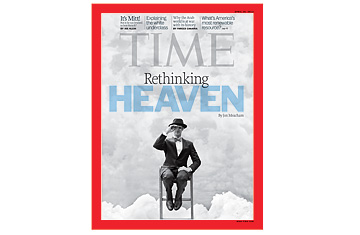
(2 of 6)
It's a distinction with some very worldly implications. If heaven is seen as life's ultimate reward, then one's vision of paradise shapes how one lives. It is an essential tenet of Christian faith, of course, to love one's neighbor. But if you believe the world will be destroyed at the last day while the blessed look down from a disembodied heaven, then you are most likely going to view the things of this world in a different light than someone who believes there will be a bodily resurrection on an earth that is to be, in the words of a great hymn, "our eternal home." Accepting the latter can mean different priorities, conceivably putting issues like saving the environment up there with saving souls. As Blanchard suggests, it also has consequences for churches hungry to reach young people. A heaven that demands stewardship now may well resonate more with an activist generation.
Those who advocate the heaven-on-earth view must confront a widely held (and for many, deeply cherished) belief that goes beyond religion. Across the history of Christianity, the blue-sky afterlife is intertwined with culture, politics, economics, class and psychology. Seeing heaven as the world beyond this one can offer powerful comfort, particularly in life's most dire circumstances. In a recent interview with Time, Trayvon Martin's parents said they believed their slain son was "in heaven with God, and he has on a hoodie."
But a more intimately connected heaven and earth is worth a deeper look. The debate doesn't fit easily on the usual left-right, blue-red, liberal-conservative spectrum. That's because each understanding is rooted explicitly in faith in the salvation history of Jesus. The divide isn't about a secular ideal of service vs. a religiously infused vision of reality. It's about whether believing Christians see earthly life as inextricably bound up with eternal life or as simply a prelude to a heavenly existence elsewhere.
A word of disclosure: I'm a Christian--a poor one, to be sure--who keeps the feast and says his prayers. For me, the scholarly redefinition of heaven as a manifestation of God's love on earth has been illuminating, for it at once puts believers in closer proximity to the intent of the New Testament authors and should inspire the religious to open their arms more often than they point fingers. Heaven thus becomes, for now, the reality one creates in the service of the poor, the sick, the enslaved, the oppressed. It is not paradise in the sky but acts of selflessness and love that bring God's sacred space and grace to a broken world suffused with tragedy until, in theological terms, the unknown hour when the world we struggle to piece together is made whole again. We could do worse than think in such terms.
A History of the Afterlife
In earliest Christianity, the understanding of life after death was, like so much else in the young faith, the product of both classical pagan and Jewish thought and custom. For the ancients, the dead were largely consigned to the shadowy underworld of Hades; at times the virtuous and the heroic were given eternal life in the elysian fields or distant western islands.
